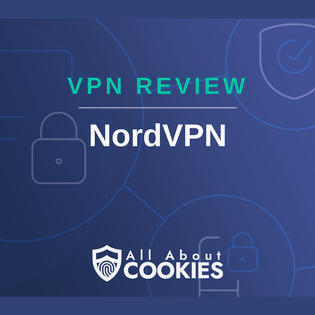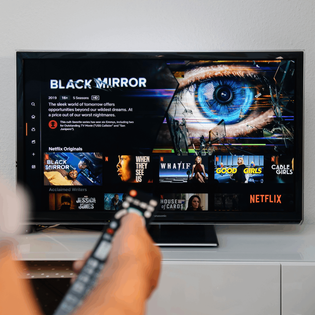Advertiser Disclosure
All About Cookies is an independent, advertising-supported website. Some of the offers that appear on this site are from third-party advertisers from which All About Cookies receives compensation. This compensation may impact how and where products appear on this site (including, for example, the order in which they appear).
All About Cookies does not include all financial or credit offers that might be available to consumers nor do we include all companies or all available products. Information is accurate as of the publishing date and has not been provided or endorsed by the advertiser.
Editorial Policy
The All About Cookies editorial team strives to provide accurate, in-depth information and reviews to help you, our reader, make online privacy decisions with confidence. Here's what you can expect from us:
- All About Cookies makes money when you click the links on our site to some of the products and offers that we mention. These partnerships do not influence our opinions or recommendations. Read more about how we make money.
- Partners are not able to review or request changes to our content except for compliance reasons.
- We aim to make sure everything on our site is up-to-date and accurate as of the publishing date, but we cannot guarantee we haven't missed something. It's your responsibility to double-check all information before making any decision. If you spot something that looks wrong, please let us know.
Best for Reliability and Privacy
-
Unblocks Netflix, Disney+, and more
-
Compatible with most devices and browsers
-
One of the most expensive VPNs overall
Best for Low Prices
-
Cheaper than ExpressVPN
-
Unlimited devices for each plan
-
Past privacy issues and data logging
ExpressVPN has a better history with its no-logs policy than IPVanish, provides solid download speeds, and unblocks streaming content from many popular services, including Netflix and Disney+.
IPVanish is the cheaper option of the two (starts at $2.99/mo vs. $6.67/mo), did better on its speed tests, and performed well on its streaming tests. But we lean toward ExpressVPN, even though it’s more expensive because IPVanish hasn’t always stuck to its no-logs policy. ExpressVPN also has servers in more countries.
Let’s dig into the details of our ExpressVPN vs. IPVanish review to see how both services compare when it comes to streaming, internet speeds, security features, and more.
ExpressVPN vs. IPVanish: prices
ExpressVPN vs. IPVanish: features
ExpressVPN vs. IPVanish: streaming support
ExpressVPN vs. IPVanish: internet speeds
ExpressVPN vs. IPVanish: compatibility and customer support
IPVanish vs. ExpressVPN FAQs
ExpressVPN vs. IPVanish: which is the best VPN?
ExpressVPN vs. IPVanish at a glance
ExpressVPN and IPVanish are two well-known virtual private networks (VPNs) with differences in these areas:
- Price
- Max number of devices
- Server count and locations
- Compatibility
- No-logs policies
How do ExpressVPN and IPVanish compare?
 ExpressVPN Our Pick
|
 IPVanish |
|
| Price | Starts at $6.67/mo | Starts at $2.99/mo |
| Max connected devices | 8 | Unlimited |
| 24/7 customer support | ||
| Compatibility | Windows, macOS, Linux, iOS, Android, and more | Android, iOS, Windows, macOS, Linux, Fire TV Stick, Fire TV, and certain routers |
| Number of servers | Servers in 105 countries | 2,200+ servers in 75+ countries |
| VPN protocol | Lightway, OpenVPN, IKEv2, L2TP/IPsec | OpenVPN, WireGuard, IKEv2, IPsec |
| No-logs policy | No logs | No logs |
| Unblocks Netflix? | ||
| Get ExpressVPN | Read IPVanish Review |
ExpressVPN has prices that range from $6.67–$12.95/mo, which is more expensive than IPVanish at $2.99–$12.99/mo. But both VPNs offer a 30-day money-back guarantee.
The maximum number of devices is how many devices — phones, laptops, tablets, etc. — you’re allowed to connect to your VPN account. ExpressVPN limits you to eight devices, whereas IPVanish has no limit.
IPVanish has an average server and location count, with more than 2,200 servers in over 75 countries. ExpressVPN doesn’t publish its exact number of servers, but it has servers in 105 countries, which is a much higher number.
You might want more servers to choose from so you can help avoid busy servers that could slow down your internet connection. Also, having servers in more countries means you get more opportunities for unblocking regional streaming content.
ExpressVPN provides compatibility with more devices, operating systems, and apps than IPVanish. This includes popular browser extensions, such as Chrome and Firefox.
You can also use the ExpressVPN smart DNS feature (MediaStreamer) to use certain VPN features on devices that wouldn’t typically have access to a VPN app. This could include some smart TVs and gaming consoles, or a streaming device such as an Apple TV.
Both ExpressVPN and IPVanish have had independent audits done of its no-logs policies. The ExpressVPN audit was more recent (2023) than the IPVanish audit (2022). Plus, IPVanish breached its no-logs policy in the past (2016), whereas ExpressVPN hasn’t had any similar issues that we’re aware of.
ExpressVPN vs. IPVanish: prices
| ExpressVPN Our Pick
|
IPVanish | |
| Price range | $6.67–$12.95/mo | $2.99–$12.99/mo |
| Best value plan | 12-month plan for $6.67/mo | 2-year plan for $2.99/mo |
| Money-back guarantee | Yes — 30 days | Yes — 30 days |
| Get ExpressVPN | Read IPVanish Review |
ExpressVPN costs between $6.67–$12.95/mo, with its lowest-priced option being a one-year plan at $6.67/mo.
IPVanish costs between $2.99–$12.99/mo, with its lowest-priced option being a two-year plan at $2.99/mo.
Overall, IPVanish is the cheaper option if you want to save money on a VPN.
We’re actually quite disappointed in how much ExpressVPN costs compared with other VPNs. Its lowest-priced option is more than double the cost of the equivalent option from IPVanish.
This doesn’t actually mean ExpressVPN is extremely expensive, especially if you compare it to other monthly bills. For example, the basic Netflix plan without ads is $9.99/mo. And maybe ExpressVPN is worth the cost for its smart DNS functionality or the fact that you get nearly double the amount of countries to connect to compared to IPVanish.
But without a doubt, IPVanish is cheaper. For another cheaper (than ExpressVPN) alternative that has smart DNS and more servers than IPVanish, consider NordVPN.
ExpressVPN vs. IPVanish: features
| Feature | ExpressVPN Our Pick
|
IPVanish |
| Number of servers | Servers in 105 countries | 2,200+ servers in 75+ countries |
| No-logs policy | No logs | No logs |
| VPN headquarters | British Virgin Islands | New York, U.S. |
| Encryption | AES-256 | AES-256 |
| VPN protocol | Lightway, OpenVPN, IKEv2, L2TP/IPsec | OpenVPN, WireGuard, IKEv2, IPsec |
| Kill switch | ||
| Split tunneling | Yes (not available for macOS 11 and above) | Yes (Android and FireOS only) |
| Netflix support | ||
| Torrenting support | ||
| Get ExpressVPN | Read IPVanish Review |
Both ExpressVPN and IPVanish provide strict no-logs policies, kill switches, torrenting support, and high-level encryption. You can also use either VPN to unblock regional Netflix content.
And although both providers offer split tunneling, which allows specific apps to bypass your VPN, the functionality for this feature with IPVanish is limited to Android and FireOS devices. This is something we noticed when we couldn’t find a split tunneling option while using the IPVanish Windows app. ExpressVPN also notes that split tunneling is unavailable for macOS 11 and above, but you can use it on other devices.
It’s likely not a huge deal for the average VPN user, but having more features and functionality across different devices is typically useful for different situations.
For example, you might use your VPN to stream foreign content and at the same time use split tunneling to bypass the secure connection on an online game you’re playing. This could free up bandwidth to improve your game’s performance while still allowing you to unblock regional streaming content.
ExpressVPN has servers in more countries than IPVanish. This could be helpful if you’re looking to connect to servers in specific locations. For instance, you might want to access a streaming platform that’s available only in a certain country or region, such as Hotstar India.
Unfortunately, ExpressVPN doesn’t publish a concrete number of how many servers it actually has, while IPVanish has more than 2,200. The number of servers could matter, depending on how many people use a VPN service. More connections increases server load, which could reduce your performance if you connect to a busy server.
But overall, thousands of servers is typically enough to find a server that works for you. And even though ExpressVPN doesn’t publish its server count, we haven’t had any issues while connected to different servers.
We like how IPVanish shows server load percentages, ping, and the number of servers for each of its locations. This makes it easier to see whether a particular location is experiencing a high server load.
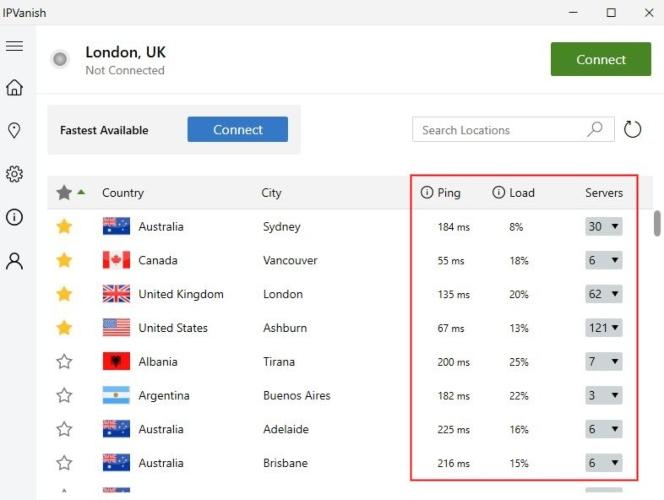
Based on our research and the past history of both companies, ExpressVPN is more private and secure than IPVanish. This is primarily due to the fact that ExpressVPN is headquartered in the British Virgin Islands, has had an independent audit done of its no-logs policy in 2023, and has been involved with government agencies but hasn’t revealed any user information.
IPVanish has also had an independent audit done of its no-logs policy, performed in 2022 by Leviathan Security Group, a security firm based out of Seattle. But IPVanish was also involved in a privacy scandal in 2016 when it revealed user information to an agent of the U.S. government.
This was shocking because IPVanish has long maintained that it enforces a strict no-logs policy, so it shouldn’t have had those user logs in the first place, much less handed them over to the authorities. IPVanish has since basically washed its hands of the whole thing, citing different ownership at the time.
And maybe IPVanish has changed its ways, but that’s still a tough stain to remove. However, we did test and find that both IPVanish and ExpressVPN don’t have WebRTC leaks, provide DNS leak protection, and can successfully mask your IP address.
The other matter of concern with IPVanish is that it’s based out of the U.S., whereas ExpressVPN is based out of the British Virgin Islands. The U.S. is a Five Eyes Alliance member, which is a global alliance that’s involved in the surveillance of citizens within the borders of its member countries.
The British Virgin Islands aren’t affiliated with the Five Eyes Alliance and don’t have data retention laws, which means ExpressVPN doesn’t have to retain user logs.
We like that you can use an unlimited number of devices with one IPVanish account. This makes it easy to set up all the devices in your home and, if you want, share your account with friends and family. ExpressVPN limits you to eight total devices, which is a small number given the service’s price tag.
ExpressVPN vs. IPVanish: streaming support
| Platform | ExpressVPN Our Pick
|
IPVanish |
| Netflix | ||
| Amazon Prime Video | ||
| Hulu | ||
| BBC iPlayer | ||
| Disney+ | Yes (in the U.S., not the U.K.) | |
| HBO Max | ||
| Get ExpressVPN | Read IPVanish Review |
We tested ExpressVPN and IPVanish to see if they work with Netflix, Amazon Prime Video, Hulu, and other streaming services. We used a Chrome browser on Windows to run the streaming services while separately connecting to each VPN service.
Our testing involved seeing if we could actually open the different streaming services while connected to each VPN. And if we could open the services, we checked to see whether the content would load without any lag or quality issues.
Both ExpressVPN and IPVanish worked with Netflix, Prime Video, Hulu, and other streaming services. We were also able to access Disney+ and BBC iPlayer with both services, but IPVanish had issues loading Disney+ while connected to a U.K. server.
This means we weren’t able to access Star content, which is available in some Disney+ libraries abroad, with the IPVanish VPN. We had no issues accessing Star content on Disney+ with ExpressVPN.
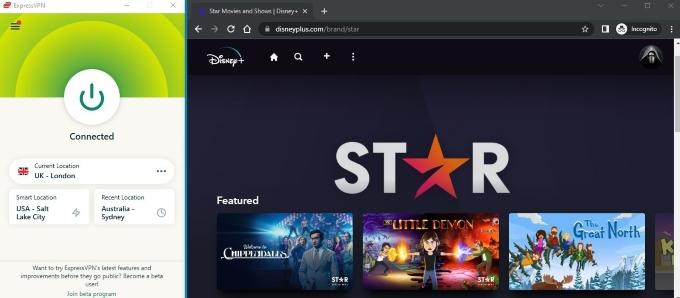
Overall, you can watch Netflix with a VPN with either ExpressVPN or IPVanish. But ExpressVPN generally had fewer issues, specifically because IPVanish couldn’t load a foreign Disney+ content library.
There’s a point to be made about using the IPVanish SOCKS5 proxy to unblock streaming content, but this is more of an advanced feature and might not be as easy for a beginner VPN user to figure out. It likely makes more sense to go with a VPN that works with streaming content without having to do anything other than connect to a server.
ExpressVPN vs. IPVanish: internet speeds
We run speed tests before and after connecting to VPNs to see whether the VPN connection significantly slows down our internet.
We know that VPNs take bandwidth and typically slow down your internet somewhat. But we want to see if it’s enough of a decrease to affect everyday activities, such as playing online games or surfing the web.
To measure this, we test our internet before connecting to a VPN to get a baseline speed. We then run individual speed tests while separately connecting to servers in different worldwide locations for each VPN service.
ExpressVPN vs. IPVanish speed test results
| Server locations | ExpressVPN | IPVanish Our Pick
|
| US | 98% slower | 42% slower |
| UK | 83% slower | 11% slower |
| AU | 39% slower | 14% slower |
| Get ExpressVPN | Read IPVanish Review |
IPVanish maintained better speeds than ExpressVPN, especially as the physical distance increased. In particular, the IPVanish server in the U.K. slowed down significantly less than ExpressVPN server in the U.K.
Both VPNs actually had the biggest slowdowns when connected to U.S. servers, which is an usual result. You can typically expect your internet connection to be a bit slower when connected to distant VPN servers, like connecting to a server in Australia if you’re in the U.S. And that simply comes down to the sheer distance between both ends of the connection.
ExpressVPN vs. IPVanish: compatibility and customer support
| ExpressVPN Our Pick
|
IPVanish | |
| Windows | ||
| macOS | ||
| Android | ||
| iOS | ||
| Linux | ||
| Routers | ||
| Smart devices | Only FireOS devices (Amazon Fire TV Stick, Amazon Fire TV, etc.) | |
| Browser extensions | Yes — Google Chrome, Mozilla Firefox, and Microsoft Edge | |
| 24/7 customer support | ||
| Customer support options | Live chat, email, online guides | Live chat, phone, email, online guides |
| Get ExpressVPN | Read IPVanish Review |
ExpressVPN vs. IPVanish: compatibility and interface
It was simple and straightforward to set up the ExpressVPN and IPVanish Windows apps on our desktop computer. We didn’t do anything more than visit the websites for each provider, download and install the apps, and then log in.
We didn’t have any glaring issues with either the ExpressVPN or IPVanish apps, but we preferred ExpressVPN. Both apps were generally easy to use and understand, but we enjoyed the minimalistic approach to the ExpressVPN app. It was a much smaller window that would then pop out another window if you wanted to access certain things, such as the settings or server list.
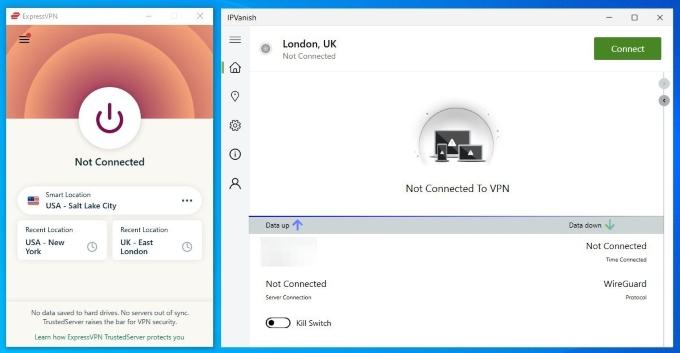
Compare this to the IPVanish app, which was a larger window that had everything in one place. It was convenient and, again, there was nothing necessarily wrong with IPVanish, but we felt more comfortable using ExpressVPN.
Both VPNs provide loads of compatibility for different devices, but ExpressVPN matches what IPVanish has and then does more with smart devices and browser extensions. This includes compatibility with Chrome, Firefox, and Edge.
You can also use the ExpressVPN MediaStreamer smart DNS service to use certain VPN functionality, such as unblocking streaming content, on devices that wouldn’t typically work with a VPN. For example, you can use ExpressVPN on different types of gaming consoles and smart TVs that don’t have access to the ExpressVPN app.
IPVanish doesn’t have a smart DNS feature, which limits where you can use its VPN.
ExpressVPN vs. IPVanish: customer support
ExpressVPN and IPVanish provide customer service options with 24/7 live chat, email, and online guides. It’s typically a good sign if a VPN has 24/7 live chat because this is often the easiest and quickest way to get answers to any of your questions at any time.
But keep in mind that, like many live chat experiences, the people you speak with through these support options might not have a lot of technical knowledge. So if you’re asking advanced questions about VPNs, it will likely be hit or miss whether a live chat representative can sufficiently answer your questions.
Having said that, we had good experiences using the live chat features with both ExpressVPN and IPVanish. We asked ExpressVPN about needing to use any specific servers for torrenting (and whether torrenting is supported) and we asked IPVanish about the availability across devices for their split tunneling feature.
We were connected to an ExpressVPN chat rep in 10 seconds or less and they informed us that ExpressVPN does support torrenting and you can connect to any server. This was helpful because it let us know that ExpressVPN doesn’t have specific servers that are optimized for torrenting, so any server should work.
It took a similar amount of time to connect with an IPVanish chat rep. We asked them if split tunneling is available on the Windows app because we couldn’t see an option on our end and our research showed that IPVanish only provides this feature on Android and FireOS devices.
The representative quickly confirmed what we had already thought and then went the extra mile to see if more availability would arrive in the future.
They said IPVanish has plans to add split tunneling to more devices, but there wasn’t an exact time frame. Even without a specific date, it was nice to see a customer service rep take the time to find out more information to help.
Surprisingly, IPVanish also provides telephone numbers to contact its support team in the U.S., the U.K., Mexico, Spain, Australia, and Brazil. From our experience, most VPNs don’t provide phone numbers. ExpressVPN doesn’t. This is likely because call centers cost money and the customer base for popular VPNs is often worldwide, which might create certain language barriers.
But if you prefer talking to VPN support over the phone, you have the option to call IPVanish.
ExpressVPN vs. IPVanish: payment options
It’s easy to pay for either VPN service with their available payment methods, but ExpressVPN provides more options than IPVanish. This includes being able to use bitcoin as payment.
Your personal information isn’t typically attached to a cryptocurrency transaction, which means a crypto payment could offer more privacy than using a credit card or PayPal. However, paying with cryptocurrency doesn’t mean your payment is completely anonymous.
Note that IPVanish provides Google Pay as a payment option and ExpressVPN doesn’t. This isn’t a huge deal, but it could be more convenient for you depending on how you typically purchase goods and services.
ExpressVPN payment options
- Credit card
- PayPal
- Bitcoin
- Paymentwall
IPVanish payment options
- Credit card
- PayPal
- Google Pay
IPVanish vs. ExpressVPN FAQs
Is ExpressVPN better than IPVanish?
We like ExpressVPN more than IPVanish because it provided superior streaming support in our tests and hasn’t had issues with its no-logs policy.
IPVanish is still a fast VPN that offers above-average streaming support, but it’s hard to trust a service that has leaked private user information to the U.S. government in the past.
What VPN is better than ExpressVPN?
It depends on what you’re looking for, but these VPNs have varying features that are better than what ExpressVPN has to offer:
- NordVPN: Cheaper and has had more independent audits of its no-logs policy.
- Surfshark: Cheaper and allows unlimited simultaneous connections.
- Private Internet Access: Much cheaper, but has a U.S. headquarters.
What is the best VPN for streaming?
We’ve tested many different VPNs with a variety of streaming services, with a focus on whether the different VPN providers work with Netflix. We had no significant streaming issues during our testing with these VPNs:
ExpressVPN vs. IPVanish: which is the best VPN?
We recommend ExpressVPN over IPVanish because it has a better history with its no-logs policy, isn’t located in the U.S., and provides superior streaming support. That’s in addition to offering fast speeds, 24/7 customer support, and a more anonymous payment option via bitcoin.
IPVanish is definitely the cheaper option vs. ExpressVPN, especially considering ExpressVPN is one of the more expensive services out there. And the speed tests with IPVanish were great.
But we don’t like that IPVanish is headquartered in the U.S. (because of privacy concerns) and that the company once turned over user logs to the U.S. government. We also had issues accessing Disney+ content while connected to a server in the U.K.
For more popular VPN comparisons, see how IPVanish compares to NordVPN.
-
Premium VPN offering strong security and ultra-fast speeds
-
Strict no-logs policy with independent audit
-
In-house Lightway protocol for more speed and security
-
More expensive than NordVPN, Surfshark, and CyberGhost

